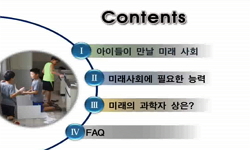The purpose of this study was to explore the instructional conditions to effectively teach basic thinking skills to learners. The basic thinking skills to be reviewed in the study were observation, inference, analysis, comparison, and evaluation. The ...
http://chineseinput.net/에서 pinyin(병음)방식으로 중국어를 변환할 수 있습니다.
변환된 중국어를 복사하여 사용하시면 됩니다.
- 中文 을 입력하시려면 zhongwen을 입력하시고 space를누르시면됩니다.
- 北京 을 입력하시려면 beijing을 입력하시고 space를 누르시면 됩니다.

기초적 사고 기능의 개발을 위한 수업 조건 = A Study of Instructional Conditions for Developing Basic Thinking Skills
한글로보기부가정보
다국어 초록 (Multilingual Abstract)
However, it seems that the study can suggest ideas and directions for investigations of instructional conditions and strategies for further studies on developing learners' basic thinking skills. Based upon the study, instructional conditions for developmental thinking skills(concept formation, explanation, prediction, and hypothesis formation), and complex thinking strategies(problem solving, decision making, critical thinking and creative thinking) can be further explored. In addition, further research on instructional conditions explored in this study and on effects of their applications in the classroom can be conducted.
The purpose of this study was to explore the instructional conditions to effectively teach basic thinking skills to learners. The basic thinking skills to be reviewed in the study were observation, inference, analysis, comparison, and evaluation. The instructional conditions were explored according to the nature of what is to be learned, the learner, the learning environment, and the instructional development constraints by each thinking skill. This study has constraints which have not covered overall conditions of teaching and learning for most of basic thinking skills.
However, it seems that the study can suggest ideas and directions for investigations of instructional conditions and strategies for further studies on developing learners' basic thinking skills. Based upon the study, instructional conditions for developmental thinking skills(concept formation, explanation, prediction, and hypothesis formation), and complex thinking strategies(problem solving, decision making, critical thinking and creative thinking) can be further explored. In addition, further research on instructional conditions explored in this study and on effects of their applications in the classroom can be conducted.
국문 초록 (Abstract)
이 연구는 기초적 사고 기능을 효과적으로 가르칠 조건을 탐색하기 위한 목적으로 수행되었다. 기초적 사고 기능은 김영채(2013)가 분류한 관찰, 추론, 분석, 비교와 평가로 선정되었다. 이들...
이 연구는 기초적 사고 기능을 효과적으로 가르칠 조건을 탐색하기 위한 목적으로 수행되었다. 기초적 사고 기능은 김영채(2013)가 분류한 관찰, 추론, 분석, 비교와 평가로 선정되었다. 이들을 개발하기 위한 수업 조건은 사고의 내용, 학습자, 학습환경, 그리고 수업활동 제한점의 특성을 중심으로 정리되었다. 이 연구는 지금까지 개발된 모든 사고 기능의 개발을 위한 수업 조건을 포괄하지 못하고, 더 많은 기초적 사고 기능을 다루지 못한 한계점을 갖고 있다. 그렇지만 이 논문은 사고력의 개발을 위해서 기초적 기능부터 바르게 사고하도록 가르칠 전략과 각 사고 기능의 습득에 필요한 수업 조건의 연구에 의미 있는 시사점을 줄 수 있다. 이 연구를 바탕으로 발달적 사고 기능(개념, 설명, 예측과 가설), 그리고 복합적 사고 전략(문제해결, 의사결정, 비판적 및 창의적 사고)의 개발을 위한 수업 조건에 관한 연구가 계속 수행될 수 있다. 물론 여기서 제시한 기초적 사고 기능을 가르치기 위한 조건을 실제 수업에 적용해서 그것의 효과를 검증하는 연구도 이뤄질 수 있다.
참고문헌 (Reference)
1 김영채, "창의력의 이론과 개발" 교육과학사 2007
2 이재왕, "온라인 토론 유형이 비판적 사고기능의 개발과 인지적 참여의 수준에 미치는 영향" 대한사고개발학회 6 (6): 121-143, 2010
3 곽병선, "사고력을 기르는 수업" 안동대학교 1-11, 2008
4 한국교육개발원, "사고력 신장을 위한 프로그램 개발 연구(III, IV)" 한국교육개발원 1989
5 김영채, "사고력 교육-이론과 실제" 유원북스 2013
6 김영채, "사고력 : 이론, 개발과 수업" 교육과학사 1998
7 김종석, "사고기능과 교수ㆍ학습 전략" 교육과학사 1997
8 김영채, "독서이해와 글쓰기" 교육과학사 2011
9 Reigeluth, C. M., "What is instructional-design theory and how is it changing?, In Instructional-design theories and models: Volume II" LEA 5-30, 1999
10 TP SNVA, "What do you see? Making observations and inferences"
1 김영채, "창의력의 이론과 개발" 교육과학사 2007
2 이재왕, "온라인 토론 유형이 비판적 사고기능의 개발과 인지적 참여의 수준에 미치는 영향" 대한사고개발학회 6 (6): 121-143, 2010
3 곽병선, "사고력을 기르는 수업" 안동대학교 1-11, 2008
4 한국교육개발원, "사고력 신장을 위한 프로그램 개발 연구(III, IV)" 한국교육개발원 1989
5 김영채, "사고력 교육-이론과 실제" 유원북스 2013
6 김영채, "사고력 : 이론, 개발과 수업" 교육과학사 1998
7 김종석, "사고기능과 교수ㆍ학습 전략" 교육과학사 1997
8 김영채, "독서이해와 글쓰기" 교육과학사 2011
9 Reigeluth, C. M., "What is instructional-design theory and how is it changing?, In Instructional-design theories and models: Volume II" LEA 5-30, 1999
10 TP SNVA, "What do you see? Making observations and inferences"
11 Bruner, J. S., "Toward a theory of instruction" Norton & Company 1966
12 Gagné, R. M., "The conditions of learning" Holt 1985
13 Piaget, J., "The children's conception to the world" Littlefield Adams 1967
14 Landa, L. N., "The algo-heuristic theory and methodology of learning, performance, and instruction as a paradigm, In Instructional development paradigms" Educational Technology Publications 661-693, 1997
15 Baron, J. B., "Teaching thinking skills" Freeman 1987
16 Orlich, D. C., "Teaching strategies : A guide to effective instruction" Wadsworth 2010
17 Button, A., "Teaching children to make inferences"
18 Perkins, D. N., "Teaching and learning for understanding, In Instructional-design theories and models, Volume II" LEA 91-114, 1999
19 Bloom, B. S., "Taxonomy of educational objectives : The classification of educational goals-Handbook I. Cognitive domain." McKay 1956
20 한국경제, "STRONG KOREA 창조포럼 2013" 한국경제 2013
21 Driscoll, M., "Psychology of learning for instruction" Pearson 2005
22 Nickerson, R., "On improving thinking through instruction, In Review of Research in Education" AERA 3-57, 1988
23 Vygotsky, L. S., "Mind in society" Harvard University Press 1978
24 Wegerif, R., "Literature review in thinking skills, technology and learning"
25 Mayer, R., "Learning and instruction(2nd ed.)" Pearson Merrill Prentice Hall 2008
26 Beyer, B. K., "Improving thinking skills : Practical approaches" 65 (65): 556-560, 1984
27 McGuinness, C., "From thinking skills to thinking classroom : A review and evaluation of approaches for developing pupils' thinking" DfEE Publications 1999
28 Moore, K. D., "Effective instructional strategies : From theory to practice" Sage 2009
29 Gardner, H., "Creating minds" Basic Books 1993
30 Silver, H. F., "Compare & contrast : Teaching comparative thinking to strengthen student learning" ASCD 2010
31 Marzano, R. J., "Classroom instruction that works : Research-based strategies for increasing student achieve-ment" ASCD 2001
32 Wilson, V., "Can thinking skills be taught? A paper for discussion" Scottish Council for Research in Education
33 BrainyQuote, "Accuracy of observation is the equivalent of accuracy of thinking"
동일학술지(권/호) 다른 논문
-
학교 현장 적용을 위한 고등사고력 교육의 원칙 및 제한점
- 대한사고개발학회
- 신종호
- 2013
- KCI등재후보
-
창의적 문제 해결력 구성 요소간의 역동적 상호작용에 관한 연구 분석
- 대한사고개발학회
- 조석희
- 2013
- KCI등재후보
-
Developing Creative Thinking among Design Students: A Case Study of Hong Kong
- 대한사고개발학회
- Kin Wai Michael Siu
- 2013
- KCI등재후보
-
- 대한사고개발학회
- 조연순
- 2013
- KCI등재후보
분석정보
인용정보 인용지수 설명보기
학술지 이력
| 연월일 | 이력구분 | 이력상세 | 등재구분 |
|---|---|---|---|
| 2027 | 평가예정 | 재인증평가 신청대상 (재인증) | |
| 2021-01-01 | 평가 | 등재학술지 유지 (재인증) |  |
| 2018-01-01 | 평가 | 등재학술지 유지 (등재유지) |  |
| 2015-01-01 | 평가 | 등재학술지 선정 (계속평가) |  |
| 2013-01-01 | 평가 | 등재후보학술지 유지 (기타) |  |
| 2012-01-01 | 평가 | 등재후보학술지 유지 (기타) |  |
| 2011-01-01 | 평가 | 등재후보학술지 유지 (등재후보1차) |  |
| 2009-01-01 | 평가 | 등재후보학술지 선정 (신규평가) |  |
학술지 인용정보
| 기준연도 | WOS-KCI 통합IF(2년) | KCIF(2년) | KCIF(3년) |
|---|---|---|---|
| 2016 | 1.34 | 1.34 | 1.6 |
| KCIF(4년) | KCIF(5년) | 중심성지수(3년) | 즉시성지수 |
| 1.57 | 1.48 | 2.197 | 0.46 |




 KCI
KCI




